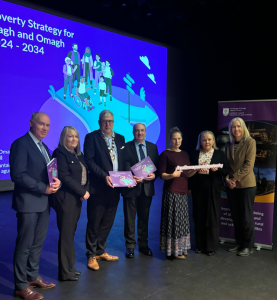Sick and Tired
14 November 2024
By Sheena McMullen
Action for Children recently published new research, “Sick and Tired: a look at the hardships and work prospects of sick and disabled parents relying on incapacity benefits.” It provides an insight into why parents on sickness benefits struggle to get back into work. It is part of Action for Children’s “Barriers to Work Series” which highlights the challenges of presuming work as a singular strategy for those facing hardship and not able to afford the essentials.
Action for Children wanted to better understand the key barriers to work and hardships facing an estimated 800,000 parents across the UK, including more than 96,000 in Northern Ireland, who rely on certain benefits to support their children.
With welfare spending across the UK on disabilities and sickness projected to reach £100bn by the end of the decade, we carried out a survey and in-depth interviews with parents on sickness (incapacity) benefits to better understand the pressures they face and the potential solutions to getting more of them back into paid employment.

Key barriers to work
Among parents who felt their health or disability didn’t rule out work completely in the future, Action for Children found the most common barriers to returning to paid employment included:
- being too unwell to work or work more right now (35%);
- not getting the treatment they need from the NHS (23%);
- a lack of suitable or flexible jobs (23%);
- a lack of remote jobs (20%); and
- a fear of losing benefits if they try work (20%).
Despite commentary suggesting rising demand for incapacity benefits is being driven by a ‘sick note culture’ of people feeling ‘bluesy’ in response to normal everyday pressures, our findings suggest a far more complicated picture, with only eight per cent of parent claimants reporting stress or anxiety to be their primary health condition. Overall, 29% of parents reported a mental health condition as their primary health condition.
Financial hardships
Polling highlighted the financial impact of living on incapacity benefits was having on families, with:
- only 12% of parents being able to keep up with all bills and credit commitments without any difficulties; and
- nearly three in ten (29%) falling behind on bills, including one in seven (15%) experiencing severe financial problems.
Among parents who reported they were experiencing some difficulties:
- a third (32%) said their child had gone without new clothes or shoes when they needed them;
- three in ten (30%) said their child had not always eaten as nutritiously as they would have liked; and
- one in seven (14%) said their child had not always eaten three meals a day.
Emotional impact
When asked how their work and health situation had affected their own emotional wellbeing in the past month:
- half of parents (50%) receiving incapacity benefits felt worried or anxious about meeting bills or costs;
- nearly half (48%) of parents felt down or depressed;
- more than four in ten (44%) were worried about the government making changes to their benefits; and about their children missing out on things due to their financial situation (45%).
Solutions for returning to work
In the survey, 38% of parents who were on incapacity benefits and not in any form of paid work, said their health or disability rules out paid work completely. However, 42% thought they could return to paid work in the future, but this was dependent on their health improving and getting better support from the government and employers.
Among all parents on incapacity benefits, when asked what could help them to return to work in future:
- more than a third (36%) wanted investment in NHS mental health services;
- a third (33%) said bringing down NHS waiting lists;
- more than a quarter (26%) argued the public sector needed to create more flexible jobs for disabled people; and
- nearly a quarter (23%) called for more specialist advisers in jobcentres.
‘Trying to give your children the best start in life while managing a health condition or disability can be an incredibly difficult thing in itself. Add to that the daily battle to make ends meet on benefits that barely cover the basics and it’s clear why so many families are in such a precarious position.
‘Parents relying on sickness benefits routinely face real insecurity, juggling bills and debts while their children miss out on things most would regard as necessities. Our findings show many of these parents may never be well enough to work and it’s vital they are supported to live in security and dignity.
‘It’s also clear that while there’s a significant number of parents who want to get back into work in future, this will require an enormous joint effort cross the NHS, government and employers to give them the flexibility and support they need.”
Lorna Ballard, Director for Action for Children in Northern Ireland
Informed by this, and our previous research, Action for Children is calling on the NI Executive to –
- Address unacceptable levels of financial insecurity by including a robust Anti-Poverty strategy in the Programme for Government.
- Strengthen the rules on flexible working for employees with health conditions and disabilities and bring forward proposals for increasing the supply of highly flexible and remote working opportunities.
- Scrap the two-child limit and benefit cap policies, and introduce a Child Payment scheme, similar to Scotland, to address the high levels of poverty and hardship in low-income families with children.
- Use the evidence from the charity’s ‘Barriers to Work’ research series to help inform decision making around social security inadequacy and its impact on children and families and how best to support economic growth and remove barriers to work.
Read the full report here.
Sheena McMullan is the Campaigns, Advocacy and Policy Officer NI at Action for Children
jacktoto slot gacor situs toto toto slot situs togel toto slot situs toto toto slot situs togel rtp







